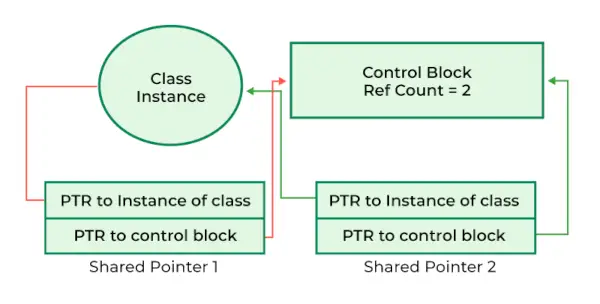std::shared_ptr to jeden z inteligentnych wskaźników wprowadzonych w C++ 11. W przeciwieństwie do prostego wskaźnika, ma on powiązany blok kontrolny, który śledzi liczbę odwołań dla zarządzanego obiektu. Ta liczba odwołań jest współdzielona pomiędzy wszystkimi kopiami instancji Shared_ptr wskazującymi na ten sam obiekt, zapewniając prawidłowe zarządzanie pamięcią i usuwanie.
Warunki wstępne: Wskaźniki w C++ , Inteligentne wskaźniki w C++ .

Udostępniony wskaźnik w C++
Składnia std::shared_ptr
Shared_ptr typu T można zadeklarować jako:
std::shared_ptr ptr_name;>
Inicjalizacja obiektów udostępnionych_ptr
Możemy zainicjować Shared_ptr za pomocą następujących metod:
1. Inicjalizacja przy użyciu nowego wskaźnika
shared_ptr ptr (new T()); shared_ptr ptr = make_shared (new T());>
2. Inicjalizacja przy użyciu istniejącego wskaźnika
shared_ptr ptr(already_existing_pointer); shared_ptr ptr = make_shared(already_existing_pointer);>
Metody członkowskie udostępnionego_ptr
Poniżej znajdują się niektórzy członkowie powiązani z Shared_ptr:
| metoda | Opis |
|---|---|
| Resetowanie() | Resetuje std::shared_ptr do pustego, zwalniając własność zarządzanego obiektu. |
| liczba_użyć() | Zwraca bieżącą liczbę odwołań, wskazując, ile instancji std::shared_ptr ma współwłasność. |
| unikalny() | Sprawdź, czy istnieje tylko jeden std::shared_ptr będący właścicielem obiektu (liczba odwołań wynosi 1). |
| Dostawać() | Zwraca surowy wskaźnik do zarządzanego obiektu. Podczas stosowania tej metody należy zachować ostrożność. |
| zamień(shr_ptr2) | zamienia zawartość (własność) dwóch instancji std::shared_ptr. |
Przykłady std::shared_ptr
Przykład 1:
C++
>
>Wyjście
0x1365c20 A::show() A::show() 0x1365c20 0x1365c20 2 2 0 1 0x1365c20>
Przykład 2:
C++
// C++ program to illustrate the use of make_shared> #include> #include> using> namespace> std;> int> main()> {> >// Creating shared pointers using std::make_shared> >shared_ptr<>int>>shr_ptr1 = make_shared<>int>>(42);> >shared_ptr<>int>>shr_ptr2 = make_shared<>int>>(24);> >// Accessing the values using the dereference operator> >// (*)> >cout << 'Value 1: ' << *shr_ptr1 << endl;> >cout << 'Value 2: ' << *shr_ptr2 << endl;> >// Using the assignment operator (=) to share ownership> >shared_ptr<>int>>shr_ptr3 = shr_ptr1;> >// Checking if shared pointer 1 and shared pointer 3> >// point to the same object> >if> (shr_ptr1 == shr_ptr3) {> >cout << 'shared pointer 1 and shared pointer 3 '> >'point to the same object.'> ><< endl;> >}> >// Swapping the contents of shared pointer 2 and shared> >// pointer 3> >shr_ptr2.swap(shr_ptr3);> >// Checking the values after the swap> >cout << 'Value 2 (after swap): ' << *shr_ptr2 << endl;> >cout << 'Value 3 (after swap): ' << *shr_ptr3 << endl;> >// Using logical operators to check if shared pointers> >// are valid> >if> (shr_ptr1 && shr_ptr2) {> >cout << 'Both shared pointer 1 and shared pointer '> >'2 are valid.'> ><< endl;> >}> >// Resetting a shared pointer> >shr_ptr1.reset();> }> |
>
>Wyjście
Value 1: 42 Value 2: 24 shared pointer 1 and shared pointer 3 point to the same object. Value 2 (after swap): 42 Value 3 (after swap): 24 Both shared pointer 1 and shared pointer 2 are valid.>
Przykład 3: Implementacja listy połączonej za pomocą std::shared_ptr
C++
#include> #include> using> namespace> std;> // Define a singly linked list node> struct> Node {> >int> data;> >shared_ptr next;> >Node(>int> val)> >: data(val)> >, next(NULL)> >{> >}> };> class> LinkedList {> public>:> >LinkedList()> >: head(NULL)> >{> >}> >// Insert a new node at the end of the linked list> >void> insert(>int> val)> >{> >shared_ptr newNode = make_shared(val);> >if> (!head) {> >head = newNode;> >}> >else> {> >shared_ptr current = head;> >while> (current->następny) {> >current = current->następny;> >}> >current->następny = nowyWęzeł;> >}> >}> >// Delete a node with a given value from the linked list> >void> del(>int> val)> >{> >if> (!head) {> >return>;> >}> >if> (head->dane == wartość) {> >head = head->następny;> >return>;> >}> >shared_ptr current = head;> >while> (current->następny> >&& current->następny->dane != wartość) {> >current = current->następny;> >}> >if> (current->następny && bieżący->następny->dane == wartość) {> >current->następny = bieżący->następny->następny;> >}> >}> >// Traverse and print the linked list> >void> Print()> >{> >shared_ptr current = head;> >while> (current) {> >cout current = current->Następny; } cout<< 'NULL' << endl; } private: shared_ptr head; }; int main() { LinkedList linkedList; // Insert nodes into the linked list linkedList.insert(1); linkedList.insert(2); linkedList.insert(3); // Print the linked list cout << 'Linked List: '; linkedList.Print(); // Delete a node and print the updated linked list linkedList.del(2); cout << 'Linked List after deleting 2: '; linkedList.Print(); return 0; }> |
>
dfs kontra bfs
>Wyjście
Linked List: 1 ->2 -> 3 -> NULL Lista połączona po usunięciu 2: 1 -> 3 -> NULL>
